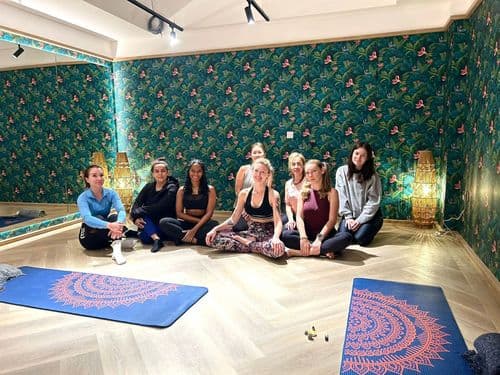Q&A with Yağmur Acar - Nutritionist & Fellow Vonder Tenant
Q&A with Yağmur Acar - Nutritionist & Vonder Tenant
Today we’re delving into the fascinating realm of nutrition and how it impacts our overall well-being. At Vonder, we are fortunate to have a diverse community of tenants, including experts in various fields, and today we have the pleasure of sitting down with Yağmur Acar, one of our fellow tenants, as well as an accomplished nutritionist.
As a member of the Federation of Nutrition Therapy Practitioners (FNTP) and with 6 years of in the industry Yağmur is more than equipt in helping us to address some common queries about healthy eating, debunking nutrition myths, and offering valuable insights. Get ready to explore the realm of nutrition with us as Yağmur unravels the secrets to a balanced and wholesome diet!
1. We all live busy lives. What are some simple changes people can make to their diet to improve their overall health?
Increase fruit and vegetable intake: Aim to include a variety of colourful fruits and vegetables in your meals. They are rich in essential nutrients, fibre, and antioxidants that support overall health.
Choose whole grains: Opt for whole grain options such as whole wheat bread, brown rice, and oats. They contain more fibre and nutrients compared to refined grains.
Reduce added sugars: Minimise consumption of sugary beverages, desserts, and processed foods high in added sugars. Instead, satisfy your sweet tooth with natural sugars from fruits.
Include lean protein sources: Incorporate lean proteins like skinless poultry, fish, beans, legumes, and tofu in your diet. They provide important amino acids and help with muscle repair and growth.
Stay hydrated: Start your day by drinking a glass of water. Drink an adequate amount of water throughout the day. Water supports digestion, nutrient absorption, and overall body functions.
Good night sleep: Prioritising 7-9 hours of good quality sleep each night is crucial for maintaining a healthy lifestyle. Sleep deprivation can disrupt hormones that control hunger (ghrelin) and fullness (leptin), leading to an increased appetite and cravings for high-calorie foods. Adequate sleep helps maintain a healthy weight and reduces the risk of obesity.
2. What are some common misconceptions about nutrition that you would like to dispel?
Myth: "Carbohydrates are bad for you." Fact: Carbohydrates are an important energy source and can be part of a healthy diet when chosen wisely, such as whole grains, fruits, and vegetables.
Myth: "Eating fat makes you fat." Fact: Healthy fats, like those found in avocados, nuts, seeds, and olive oil, are crucial for various bodily functions and can be included in moderation.
Myth: "Skipping meals helps with weight loss." Fact: Regular balanced meals and snacks support metabolism and provide sustained energy. Skipping meals can lead to overeating later.
Myth:"All fats are bad.” Fact: Not all fats are unhealthy. Healthy fats like monounsaturated and polyunsaturated fats found in avocados, nuts, seeds, and olive oil are beneficial for heart health and other bodily functions.
Myth: “We all need to take multivitamins.” Fact: Relying solely on multivitamins as a substitute for a healthy diet is not recommended. Whole foods provide not only essential nutrients but also dietary fibre, antioxidants, phytochemicals, and other beneficial compounds that support overall health. It's best to prioritise consuming nutrient-dense foods as the foundation of a healthy eating pattern.
While multivitamins can be helpful for certain individuals who have identified nutrient deficiencies or specific dietary needs, it's important to approach supplementation with caution and under the guidance of a healthcare professional or registered nutritionist & dietitian. They can assess your individual needs, conduct appropriate tests if necessary, and recommend targeted supplements if warranted.
3. Are there any important nutrients that people often overlook, or don’t realise they need in their diets, and do you think a supplement is always necessary?
People often overlook the following nutrients:
Vitamin D: It plays a crucial role in bone health and immune function. Vitamin D is primarily synthesised by the body through sunlight exposure, but it can be challenging to obtain sufficient amounts solely through sunlight and diet. Depending on factors like location and lifestyle, a supplement may be necessary.
Omega-3 fatty acids: These essential fats are important for brain health, heart health, and inflammation control. They are found in fatty fish like salmon, walnuts, flaxseeds, and chia seeds. If you don't consume these food sources regularly, a good quality supplement may be beneficial.
Whether or not a supplement is necessary depends on an individual's specific circumstances, dietary choices, and health conditions. It's best to consult with a healthcare professional or registered nutritionist & dietitian who can assess your needs and make personalised recommendations.
4. Besides not shopping when you’re hungry, what are some tips around grocery shopping for a healthier diet?
Plan your meals: Before heading to the grocery store, create a meal plan for the week. This will help you make a shopping list and avoid impulsive purchases of unhealthy items.
Read food labels: Pay attention to the ingredients list and nutrition facts labels. Choose products with minimal added sugars, lower sodium content, and minimal or no trans fats.
Limit ultra processed foods: Ultra processed foods are often high in added sugars, unhealthy fats, and sodium. Try to minimise their presence in your cart and opt for whole, unprocessed foods whenever possible.
Be mindful of portion sizes: Purchase appropriate portion sizes to prevent overeating. Bulk buying may lead to unnecessary excess consumption.
5. What are some strategies for avoiding snacking when stressed or bored?
Identify triggers: Recognise the emotions or situations that lead to stress or boredom snacking. Awareness is the first step in making positive changes.
Find alternative coping mechanisms: Instead of turning to food, explore other activities that can help manage stress or boredom. Engage in hobbies, practice relaxation techniques, exercise, or connect with others.
Practise mindful eating: Pay attention to physical hunger cues before reaching for a snack. Are you truly hungry, or is it an emotional craving? Mindful eating involves savouring and enjoying each bite, being aware of satiety signals, and eating with intention and awareness.
Plan satisfying meals: Ensure that your meals are balanced and satisfying, including protein, fibre, and healthy fats, to keep you fuller for longer and reduce the likelihood of snacking out of boredom or stress.
Keep healthy snacks available: If you genuinely feel hungry between meals, have nutritious snack options readily available, such as cut-up fruits, vegetables, yogurt, or nuts, instead of reaching for unhealthy processed snacks.
Hydrate well: Proper hydration can potentially reduce snacking tendencies. Consider incorporating alkaline water into your routine, as it has been suggested to help curb excessive snacking. Personally, I recommend giving "Alk Water" a try as my preferred brand. Give it a go and see how it works for you!
6. Many people feel that healthy living is expensive living. How can people incorporate more whole foods and fresh produce into their diet without breaking the bank?
Incorporating whole foods and fresh produce on a budget:
Shop in-season: Seasonal produce is often more affordable and abundant. Plan your meals around what's available and on sale.
Buy in bulk: Purchase pantry staples like whole grains, legumes, and nuts in bulk, which is usually cheaper than buying pre-packaged items.
Frozen and canned options: Frozen fruits and vegetables can be a cost-effective alternative to fresh produce, as they retain nutrients and have a longer shelf life. Canned options, such as beans and tomatoes, can also be economical and nutritious.
Plan meals and reduce waste: Plan your meals ahead, make a shopping list, and stick to it. This helps prevent impulse purchases and reduces food waste.
Utilise local markets: Explore farmers' markets, farm stands. They often offer fresh, locally grown produce at more affordable prices.
Grow your own: Consider starting a small herb or vegetable garden, even if it's just in pots or a small space. Growing your own produce can be cost-effective and rewarding.
7. Should we be including more flavonoids in our diet?
Importance of flavonoids in the diet:
Flavonoids are a group of beneficial plant compounds found in fruits, vegetables, whole grains, legumes, and beverages like tea and red wine.
Research suggests that flavonoids have antioxidant and anti-inflammatory properties, which may contribute to reduced risk of chronic diseases such as heart disease, certain cancers, and neurodegenerative disorders.
Including a variety of flavonoid-rich foods in your diet, such as berries, citrus fruits, dark chocolate, green tea, and leafy greens, can be part of a balanced and healthy eating pattern. However, it's important to remember that overall dietary diversity and quality are crucial, and no single nutrient or compound guarantees optimal health.
8. Do you think a co-living atmosphere helps people to stay healthy and fit (on site gym classes etc.)?
Yes 100%. The convenience of having a gym within the co-living facility can save time and eliminate the need for travelling to external fitness centres. This time-saving aspect can make it more feasible for individuals with busy schedules to prioritise regular exercise.
9. What is your favourite thing about living at Vonder Wembley?
One of the many things that I like about living in Vonder co living London is that it offers many working areas with speedy internet and friendly staff who always make you feel at home.
10. What would be your number one nutrition tip to fellow tenants at Vonder?
Always be mindful about your individual needs and never follow popular fad diets.
Our bodies and lifestyles are unique, and there is no one-size-fits-all approach to health and well-being. By being mindful of your individual needs, you can make informed choices that align with your goals, preferences, and any specific considerations you may have.
We hope you found this Q&A session with Yağmur both enlightening and inspiring. Nutrition is a vital component of our daily lives, and understanding its impact on our bodies empowers us to make informed choices that can lead to improved well-being.
On the topic of nutrition we are excited to share that Vonder is partnering with a new exciting brand - Alk Water! Alkaline water, which is water with a higher pH than standard drinking water, has recently become popular with many health professionals who like its numerous benefits. Now you can partake in these benefits too as all Vonder members qualify for an exciting special offer. Head over to our app for details, so you too can increase your body’s hydration, allowing you to perform at your very best.
As we continue to foster a supportive and healthy community at Vonder, let's embrace the knowledge we've gained today and strive to nourish ourselves with delicious, nutrient-rich meals. Here's to a vibrant and balanced lifestyle filled with good food, good company, and a commitment to our overall health. Bon appétit!

Vonder Community Yoga Classes in Wembley, Munich and Beyond
Community Yoga Classes in Wembley, Munich, Warsaw & More
READ MORE
Co living East London With Vonder Shoreditch
Experience the best of modern living in London
READ MORE
What are Community Spaces & why are they important?
What are Community Spaces & why they matter by Vonder
READ MORE